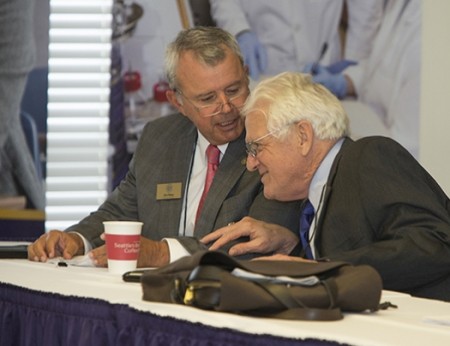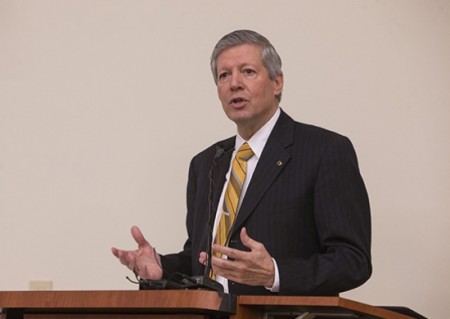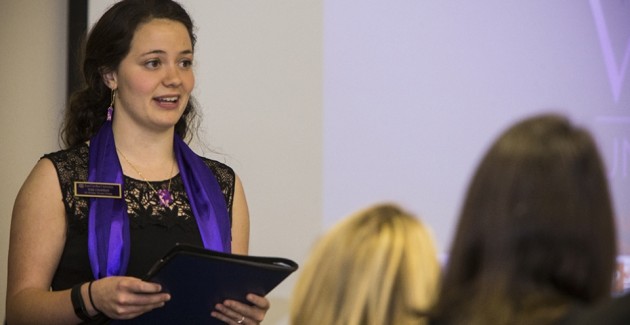Your Basic Needs: Food, Shelter and The TRUTH
Meeting On Campus
Publisher's note: The author of this post, Steve Tuttle, is a contributor to ECU News Services.
The UNC Board of Governors voted April 10 to approve East Carolina University's request to designate four parcels of property it owns as a millennial campus — sites where the university can collaborate with private companies to commercialize research discoveries and offer advanced training to benefit the region's high-tech industries.
Officials said the parcels would be known collectively as the East Carolina Research and Innovation Campus (ECRIC).
ECU officials said that millennial campus activities would initially begin on a 22.3-acre site in Greenville's warehouse district on 10th Street a few blocks west of main campus. The site, which ECU acquired several years ago, covers seven blocks and includes three tobacco warehouses listed on the National Register of Historic Places.
One of the warehouses, the Export Tobacco Leaf factory known as the Haynie Building, is expected to be the initial focus of ECRIC once it is refurbished. Built in 1914, it fronts 10th Street and covers the entire block between Pitt and Greene streets three blocks west of main campus.
Millennial campuses are geographic areas where anchor institutions — usually research universities — join with education, industry, government, military and other partners to discover, invent and produce new commercial products.
Under state law, the millennial campus designation gives ECU regulatory flexibility to finance repairs to the historic buildings and leeway to collaborate in business ventures with industry partners.
ECU has received eligibility certification to apply the N.C. Historic Mill Rehabilitation Tax Credit toward the cost of renovating the warehouses, according to Scott Buck, ECU associate vice chancellor for business services. Buck said those tax credits could defray 40 percent or more of the cost of the renovations.
The focus of the millennial campus will be creating partnerships with private companies that will foster economic growth in the region and create jobs attractive to ECU graduates, said Ted Morris, ECU associate vice chancellor for innovation and economic development.
Those graduates are in high demand by regional employers and also help attract new employers to the region, Morris said.
The video above, which shares stories of ECU's impact, was presented to the UNC Board of Governors during their visit to campus.
"ECU's commitment to economic development and regional transformation is predicated on the right spaces and the business freedoms needed to interact creatively with the private sector," said Provost Ron Mitchelson. "The approval of these designated millennial spaces provides just those elements. I couldn't be more pleased and thankful for the trust and the support shown by the UNC Board of Governors."
Morris said that in the days ahead ECU and its partners will be "completing the launch of several key economic development initiatives and assembling the framework" for ECRIC.
Seven other UNC campuses already operate millennial campuses. The Centennial Campus at N.C. State University is the oldest and largest.
The Board of Governors' decision came after its Budget and Finance Committee voted on April 9 to recommend that the full board approve ECU's millennial campus request.
Committee chair Harry Smith, a 1992 ECU graduate, said initiatives like the millennial campus are needed to create the kind of high-tech pharmaceutical and advanced manufacturing jobs that appeal to graduates in the sciences, technology, engineering, arts and math fields.
"Our challenge is to retain our graduates. And to do that we have to have a vision," Smith said.
In a presentation to the committee Rick Niswander, ECU's vice chancellor for administration and finance, said East Carolina has been planning for a millennial campus for the past 10 years.
Funding for ECRIC emerged on March 2 when the Golden LEAF Foundation awarded a $1.75 million grant to ECU and Pitt Community College to establish a biopharmaceutical workforce development and manufacturing center.
In 2014 the foundation awarded ECU a $1.25 million grant to fund the Advanced Manufacturing and Innovation Academy, which immerses middle school students in careers and entrepreneurial opportunities in science, technology, engineering, arts/design and math.
 Chancellor Steve Ballard announced last November that ECU was creating a manufacturing center of excellence in partnership with three pharmaceutical companies that are major employers in the region: Patheon, Hospira and Mayne Pharma.
Chancellor Steve Ballard announced last November that ECU was creating a manufacturing center of excellence in partnership with three pharmaceutical companies that are major employers in the region: Patheon, Hospira and Mayne Pharma.
That center initially will operate out of the Sci-Tech Building under the direction of the chemistry department, Mitchelson said, and then move to the Haynie Building after it's been rehabbed.
It's anticipated that ECRIC will lease space in the Haynie Building to one or more partner companies, angel investors and some business start-ups, Mitchelson said.
In addition to the warehouse district property, the Board of Governors granted millennial campus status to three other ECU parcels. The other sites are:
Morris said ECU will develop industry partnerships and training programs for businesses that fit the use of each of the sites. A program for advanced medical devices, for example, logically would locate on the health sciences campus, Morris explained.
Meeting on the campus of ECU for the first time since March 2007, Vice Chairman W. Louis Bissette Jr. of Asheville thanked Chancellor Ballard and the entire campus community for the warm welcome.
"I think this is the friendliest part of the state, the most welcoming. You have a great university and we look forward to seeing what you'll do in the future, not only here but for the whole eastern region," he said.
 Bissette mentioned his family ties to nearby Nash County and how he spent several summers working on his uncle's tobacco farm in Pitt County.
Bissette mentioned his family ties to nearby Nash County and how he spent several summers working on his uncle's tobacco farm in Pitt County.
He also shared of his love of eastern N.C. style barbecue. "It's the greatest food ever invented," he said.
During the Educational Planning, Policies and Programs committee meeting, three ECU students spoke of their undergraduate research experiences — ranging from studying seasonal rainfall variability in Hawaii to researching in India the way that the traditional medical system has been adapted through contract with western biomedicine.
Tori Chapman, a sophomore from Webster, is a nutrition major who traveled to Honduras to work and study; Mansi Trivedi, a senior EC Scholar from Cary, is a double major in biology and religious studies; and Thomas Vaughan, a senior from Murfreesboro, is an applied atmospheric science major.
Trivedi told the BOG members, "Through my course work at ECU, the time I have spent abroad, and opportunities like my senior honors thesis I have truly learned the importance of gaining a multidisciplinary education. The diverse experiences I have had have deeply influenced me and shaped my plans after I graduate."
She will enroll in the Brody School of Medicine in the fall with plans to practice medicine in eastern North Carolina after graduation.
The UNC Board of Governors approved ECU's request to issue special obligation bonds to pay for a new student services building on the Health Sciences campus.
 The board gave the go-ahead for ECU to issue $80 million in special obligation bonds. Of that, ECU will use $30.1 million to pay for construction of the student services building and $49.9 million to refinance outstanding debt from previous campus projects at lower interest rates.
The board gave the go-ahead for ECU to issue $80 million in special obligation bonds. Of that, ECU will use $30.1 million to pay for construction of the student services building and $49.9 million to refinance outstanding debt from previous campus projects at lower interest rates.
The board and the N.C. General Assembly previously approved ECU's plan to construct student centers for main campus and the Health Sciences campus.
The student services building for the Health Sciences campus is the first phase of a two-phase project. A financing plan for the second phase — a new student center for main campus — is expected to be presented to the Board of Governors this fall.
Special obligation bonds give UNC campuses more leeway to finance construction projects than other bonds. Special obligation bonds generally can be repaid from any campus revenue source excluding tuition, state appropriations and restricted funds.
ECU currently has above-average credit ratings and is expected to retain those ratings after issuing the $80 million in bonds.
In other actions, the board:

UNC board member w. Louis Bissette Jr., center, enjoys a light moment during the meeting. (Photo by Jay Clark)
ECU's College of Nursing saw 96 percent of its bachelor of science graduates pass the national licensing exam in 2014, according to an annual report received by the UNC Board of Governors.
Of the 233 members of the College of Nursing's Class of 2014 who took the National Council Licensure Examination (NCLEX-RN), 224 passed, according to the report, which the board received at its April 10 meeting on the ECU campus.
Passing the national exam is a requisite to receiving a license from the N.C. Board of Nursing.
"It is projected that North Carolina will continue to have an increased need for nurses," said College of Nursing Dean Dr. Sylvia Brown. "We are proud to not only help meet that demand for health care in our state, but also to educate graduates who are incredibly skilled, ready to lead and sought after. We prepare more new nurses than any other program in the state."
Twelve UNC campuses have nursing programs. Of those, ECU had the largest number of bachelor of science nursing graduates taking and passing the NCLEX-RN exam. UNC-Chapel, which had 161 of its 169 text-takers passing the exam, was second largest.
The average 2014 exam passing rate for all 12 UNC system campuses with nursing programs was 92 percent in 2014, the report said. The national average was 85 percent.
The N.C. Board of Nursing requires that a nursing program's three-year average of graduates passing the exam be at least 95 percent of the national passing rate in order to remain in good standing. Thus, the minimum passing rate for UNC nursing programs in 2014 was 81 percent.
ECU's exam passing rate for 2012-14 was 95.5 percent.
Enrollment in the nursing program at N.C. A&T State University in Greensboro was suspended by the Board of Governors last year because it did not meet the three-year minimum graduation rate.
In 2014, ECU had 706 students enrolled in its bachelor of nursing program, 412 enrolled in its master's of nursing and 103 in its doctorate of nurse practitioner program, the report said. That total enrollment of 1,221 accounts for nearly 20 percent of the enrollment in all nursing degree programs at the 12 UNC campuses that offer nursing.
The bachelor of science in nursing is one of fastest-growing degrees in the UNC system, up 44 percent over the past five years. Since 2010, enrollment in UNC system bachelor's, master's and doctoral nursing programs combined rose 30 percent.
Brown noted that ECU is quickly implementing a cooperative program with six community colleges in the region aimed at graduating more nurses with bachelor's degrees.
An articulation agreement between the UNC system and the state's 58 community colleges, adopted by the Board of Governors in February, assures that students who complete an associate's degree at a community college will be awarded at least 58 semester credits upon admission to a UNC system campus with a nursing program.
Brown said ECU's Regionally Increasing Baccalaureate Nurses, or RIBN, program is "providing an economically feasible pathway for students to pursue their degree."
The articulation agreement "is great news as we work to continue providing talented graduates prepared for promising careers as tomorrow's nurses," Brown added. — Steve Tuttle

ECU nutrition major Tori Chapman shared her undergraduate research experiences April 9 during the UNC Board of Governors Committee on Educational Planning, Policies and Programs. (Photo by Cliff Hollis)
Go Back
UNC Board of Governors approves ECU millennial campus
The UNC Board of Governors voted April 10 to approve East Carolina University's request to designate four parcels of property it owns as a millennial campus — sites where the university can collaborate with private companies to commercialize research discoveries and offer advanced training to benefit the region's high-tech industries.
Officials said the parcels would be known collectively as the East Carolina Research and Innovation Campus (ECRIC).
ECU officials said that millennial campus activities would initially begin on a 22.3-acre site in Greenville's warehouse district on 10th Street a few blocks west of main campus. The site, which ECU acquired several years ago, covers seven blocks and includes three tobacco warehouses listed on the National Register of Historic Places.
One of the warehouses, the Export Tobacco Leaf factory known as the Haynie Building, is expected to be the initial focus of ECRIC once it is refurbished. Built in 1914, it fronts 10th Street and covers the entire block between Pitt and Greene streets three blocks west of main campus.
Millennial campuses are geographic areas where anchor institutions — usually research universities — join with education, industry, government, military and other partners to discover, invent and produce new commercial products.
Under state law, the millennial campus designation gives ECU regulatory flexibility to finance repairs to the historic buildings and leeway to collaborate in business ventures with industry partners.
ECU has received eligibility certification to apply the N.C. Historic Mill Rehabilitation Tax Credit toward the cost of renovating the warehouses, according to Scott Buck, ECU associate vice chancellor for business services. Buck said those tax credits could defray 40 percent or more of the cost of the renovations.
The focus of the millennial campus will be creating partnerships with private companies that will foster economic growth in the region and create jobs attractive to ECU graduates, said Ted Morris, ECU associate vice chancellor for innovation and economic development.
Those graduates are in high demand by regional employers and also help attract new employers to the region, Morris said.
The video above, which shares stories of ECU's impact, was presented to the UNC Board of Governors during their visit to campus.
"ECU's commitment to economic development and regional transformation is predicated on the right spaces and the business freedoms needed to interact creatively with the private sector," said Provost Ron Mitchelson. "The approval of these designated millennial spaces provides just those elements. I couldn't be more pleased and thankful for the trust and the support shown by the UNC Board of Governors."
Morris said that in the days ahead ECU and its partners will be "completing the launch of several key economic development initiatives and assembling the framework" for ECRIC.
Seven other UNC campuses already operate millennial campuses. The Centennial Campus at N.C. State University is the oldest and largest.
The Board of Governors' decision came after its Budget and Finance Committee voted on April 9 to recommend that the full board approve ECU's millennial campus request.
Committee chair Harry Smith, a 1992 ECU graduate, said initiatives like the millennial campus are needed to create the kind of high-tech pharmaceutical and advanced manufacturing jobs that appeal to graduates in the sciences, technology, engineering, arts and math fields.
"Our challenge is to retain our graduates. And to do that we have to have a vision," Smith said.
In a presentation to the committee Rick Niswander, ECU's vice chancellor for administration and finance, said East Carolina has been planning for a millennial campus for the past 10 years.
Funding for ECRIC emerged on March 2 when the Golden LEAF Foundation awarded a $1.75 million grant to ECU and Pitt Community College to establish a biopharmaceutical workforce development and manufacturing center.
In 2014 the foundation awarded ECU a $1.25 million grant to fund the Advanced Manufacturing and Innovation Academy, which immerses middle school students in careers and entrepreneurial opportunities in science, technology, engineering, arts/design and math.

UNC Board of Governors members Bob Rippy, left, and Thomas J. Harrelson talk before the start of the governance committee meeting. (Photo by Cliff Hollis)
That center initially will operate out of the Sci-Tech Building under the direction of the chemistry department, Mitchelson said, and then move to the Haynie Building after it's been rehabbed.
It's anticipated that ECRIC will lease space in the Haynie Building to one or more partner companies, angel investors and some business start-ups, Mitchelson said.
In addition to the warehouse district property, the Board of Governors granted millennial campus status to three other ECU parcels. The other sites are:
- The university's uptown properties — 19 acres that lie on both sides of Reade Street from Fifth Street to First Street and the river front park.
- The health sciences campus.
- The Stratford Arms and Blount Fields properties across Greenville Boulevard from Dowdy-Ficklen Stadium.
Morris said ECU will develop industry partnerships and training programs for businesses that fit the use of each of the sites. A program for advanced medical devices, for example, logically would locate on the health sciences campus, Morris explained.
Meeting on the campus of ECU for the first time since March 2007, Vice Chairman W. Louis Bissette Jr. of Asheville thanked Chancellor Ballard and the entire campus community for the warm welcome.
"I think this is the friendliest part of the state, the most welcoming. You have a great university and we look forward to seeing what you'll do in the future, not only here but for the whole eastern region," he said.

ECU Chancellor Steve Ballard speaks at the UNC Board of Governors meeting April 10. (Photo by Jay Clark)
He also shared of his love of eastern N.C. style barbecue. "It's the greatest food ever invented," he said.
During the Educational Planning, Policies and Programs committee meeting, three ECU students spoke of their undergraduate research experiences — ranging from studying seasonal rainfall variability in Hawaii to researching in India the way that the traditional medical system has been adapted through contract with western biomedicine.
Tori Chapman, a sophomore from Webster, is a nutrition major who traveled to Honduras to work and study; Mansi Trivedi, a senior EC Scholar from Cary, is a double major in biology and religious studies; and Thomas Vaughan, a senior from Murfreesboro, is an applied atmospheric science major.
Trivedi told the BOG members, "Through my course work at ECU, the time I have spent abroad, and opportunities like my senior honors thesis I have truly learned the importance of gaining a multidisciplinary education. The diverse experiences I have had have deeply influenced me and shaped my plans after I graduate."
She will enroll in the Brody School of Medicine in the fall with plans to practice medicine in eastern North Carolina after graduation.
Bonds for new student center approved
The UNC Board of Governors approved ECU's request to issue special obligation bonds to pay for a new student services building on the Health Sciences campus.

ECU biology and religious studies double major Mansi Trivedi, a senior EC Scholar, shared her experiences with the UNC Board of Governors on Thursday. (Photo by Cliff Hollis)
The board and the N.C. General Assembly previously approved ECU's plan to construct student centers for main campus and the Health Sciences campus.
The student services building for the Health Sciences campus is the first phase of a two-phase project. A financing plan for the second phase — a new student center for main campus — is expected to be presented to the Board of Governors this fall.
Special obligation bonds give UNC campuses more leeway to finance construction projects than other bonds. Special obligation bonds generally can be repaid from any campus revenue source excluding tuition, state appropriations and restricted funds.
ECU currently has above-average credit ratings and is expected to retain those ratings after issuing the $80 million in bonds.
In other actions, the board:
- Authorized ECU to spend $2.5 million to plan a major renovation to Clement Residence Hall. Officials said the 10-story dorm, built in 1969, is not in compliance with the Americans with Disability Act. The complete renovation is estimated to cost more than $20 million and will be funded from housing receipts. During the renovation, interior living spaces, bathrooms and study areas will be redone and the building exterior will be replaced. ECU is in the process of renovating four residence halls.
- Approved ECU's $550,000 acquisition of a roughly half-acre tract in uptown Greenville. The property, at 119 S. Cotanche St., is a former Pitt County ABC store. With the acquisition of the property, ECU now owns the entire block bounded by East First, East Second, Reade and Cotanche streets. ECU will use auxiliary overhead receipts to buy the property.
- Approved ECU's request to spend $498,000 to repair and renovate space inside the Brody School of Medicine building. The renovated space will become offices for the medical school's Department of Risk Management. Officials said the project, which will be paid for with carry forward funds, will begin in July and should be completed by October.

UNC board member w. Louis Bissette Jr., center, enjoys a light moment during the meeting. (Photo by Jay Clark)
96 percent of Pirate Nurses pass 2014 exam
ECU's College of Nursing saw 96 percent of its bachelor of science graduates pass the national licensing exam in 2014, according to an annual report received by the UNC Board of Governors.
Of the 233 members of the College of Nursing's Class of 2014 who took the National Council Licensure Examination (NCLEX-RN), 224 passed, according to the report, which the board received at its April 10 meeting on the ECU campus.
Passing the national exam is a requisite to receiving a license from the N.C. Board of Nursing.
"It is projected that North Carolina will continue to have an increased need for nurses," said College of Nursing Dean Dr. Sylvia Brown. "We are proud to not only help meet that demand for health care in our state, but also to educate graduates who are incredibly skilled, ready to lead and sought after. We prepare more new nurses than any other program in the state."
Twelve UNC campuses have nursing programs. Of those, ECU had the largest number of bachelor of science nursing graduates taking and passing the NCLEX-RN exam. UNC-Chapel, which had 161 of its 169 text-takers passing the exam, was second largest.
The average 2014 exam passing rate for all 12 UNC system campuses with nursing programs was 92 percent in 2014, the report said. The national average was 85 percent.
The N.C. Board of Nursing requires that a nursing program's three-year average of graduates passing the exam be at least 95 percent of the national passing rate in order to remain in good standing. Thus, the minimum passing rate for UNC nursing programs in 2014 was 81 percent.
ECU's exam passing rate for 2012-14 was 95.5 percent.
Enrollment in the nursing program at N.C. A&T State University in Greensboro was suspended by the Board of Governors last year because it did not meet the three-year minimum graduation rate.
In 2014, ECU had 706 students enrolled in its bachelor of nursing program, 412 enrolled in its master's of nursing and 103 in its doctorate of nurse practitioner program, the report said. That total enrollment of 1,221 accounts for nearly 20 percent of the enrollment in all nursing degree programs at the 12 UNC campuses that offer nursing.
The bachelor of science in nursing is one of fastest-growing degrees in the UNC system, up 44 percent over the past five years. Since 2010, enrollment in UNC system bachelor's, master's and doctoral nursing programs combined rose 30 percent.
Brown noted that ECU is quickly implementing a cooperative program with six community colleges in the region aimed at graduating more nurses with bachelor's degrees.
An articulation agreement between the UNC system and the state's 58 community colleges, adopted by the Board of Governors in February, assures that students who complete an associate's degree at a community college will be awarded at least 58 semester credits upon admission to a UNC system campus with a nursing program.
Brown said ECU's Regionally Increasing Baccalaureate Nurses, or RIBN, program is "providing an economically feasible pathway for students to pursue their degree."
The articulation agreement "is great news as we work to continue providing talented graduates prepared for promising careers as tomorrow's nurses," Brown added. — Steve Tuttle

ECU nutrition major Tori Chapman shared her undergraduate research experiences April 9 during the UNC Board of Governors Committee on Educational Planning, Policies and Programs. (Photo by Cliff Hollis)
| Debilitating Disorder | East Carolina University, School News, The Region, Neighboring Counties | The SKY Family's Celtic Revival! will be in Elizabeth City |





















